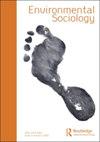Regenerative sustainability. A relational model of possibilities for the emergence of positive tipping points
IF 2.4
Q3 ENVIRONMENTAL STUDIES
引用次数: 1
Abstract
ABSTRACT Global environmental change problems are relational problems, so individual and collective actions aimed at dealing with them need to address fundamental changes about how we relate to social and biophysical systems. In this contribution, I suggest that current attempts to theorise and act on sustainability transformations would benefit from a relational perspective characterising individuals, organisations and societies as coupled social-ecological systems set in the context of accelerating global environmental change. Using a whole-life-systems’ non-exemptionalist worldview, a conceptual model is presented to help explore the theoretical possibilities for creating regenerative sustainability pathways. Learning to restore and improve the life-support conditions that ensure long-term sustainability will require enacting positive synergies between social and biophysical capitals as well as reframing anthropocentric conceptions of agency and of individual emancipation. In particular, regenerative sustainability pathways entail synergising different kinds and levels of agency in non-dualistic ways and tackle at the same time transformations in: social and institutional arrangements (S), energy and natural resources (E), information and knowledge systems (I) and accumulated environmental change (C) -the SEIC model.再生可持续性。正临界点出现可能性的关系模型
摘要全球环境变化问题是关系问题,因此旨在应对这些问题的个人和集体行动需要解决我们与社会和生物物理系统之间关系的根本变化。在这篇文章中,我认为,当前对可持续性转型进行理论化和行动的尝试将受益于将个人、组织和社会描述为在全球环境变化加速的背景下建立的耦合社会生态系统的关系视角。利用整个生命系统的非豁免主义世界观,提出了一个概念模型,以帮助探索创造再生可持续性途径的理论可能性。要学会恢复和改善确保长期可持续性的生命支持条件,就需要在社会资本和生物物理资本之间建立积极的协同作用,并重新构建以人类为中心的机构和个人解放概念。特别是,再生可持续性途径需要以非二元方式协同不同类型和级别的机构,同时应对以下方面的变革:社会和制度安排(S)、能源和自然资源(E)、信息和知识系统(I)以及累积的环境变化(C)-SEIC模型。
本文章由计算机程序翻译,如有差异,请以英文原文为准。
求助全文
约1分钟内获得全文
求助全文
来源期刊

Environmental Sociology
ENVIRONMENTAL STUDIES-
CiteScore
4.60
自引率
12.00%
发文量
34
期刊介绍:
Environmental Sociology is dedicated to applying and advancing the sociological imagination in relation to a wide variety of environmental challenges, controversies and issues, at every level from the global to local, from ‘world culture’ to diverse local perspectives. As an international, peer-reviewed scholarly journal, Environmental Sociology aims to stretch the conceptual and theoretical boundaries of both environmental and mainstream sociology, to highlight the relevance of sociological research for environmental policy and management, to disseminate the results of sociological research, and to engage in productive dialogue and debate with other disciplines in the social, natural and ecological sciences. Contributions may utilize a variety of theoretical orientations including, but not restricted to: critical theory, cultural sociology, ecofeminism, ecological modernization, environmental justice, organizational sociology, political ecology, political economy, post-colonial studies, risk theory, social psychology, science and technology studies, globalization, world-systems analysis, and so on. Cross- and transdisciplinary contributions are welcome where they demonstrate a novel attempt to understand social-ecological relationships in a manner that engages with the core concerns of sociology in social relationships, institutions, practices and processes. All methodological approaches in the environmental social sciences – qualitative, quantitative, integrative, spatial, policy analysis, etc. – are welcomed. Environmental Sociology welcomes high-quality submissions from scholars around the world.
 求助内容:
求助内容: 应助结果提醒方式:
应助结果提醒方式:


